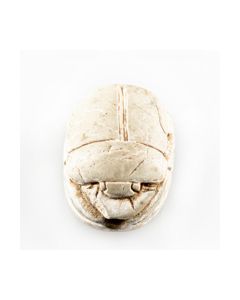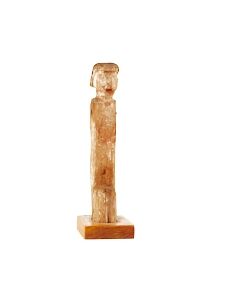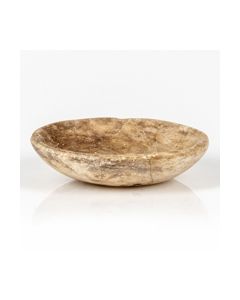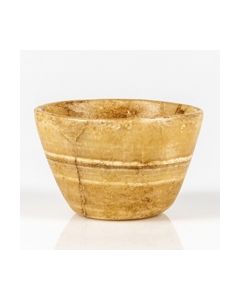Search results for: 'bronzezeit'
-
 Ushabti with interesting inscription
Ushabti with interesting inscriptionNicely painted Egyptian funerary statuette from the Ramesside Period.
Price: on request Naturalistic frog figure
Naturalistic frog figureLively depiction from the New Kingdom of Ancient Egypt. Beautiful multi-coloured stone.
Price: on request Egyptian scarab with knot design
Egyptian scarab with knot designAmulet seal with complex knot design at the underside. Second Intermediate Period of ancient Egypt.
Price: on request Nile tilapia made of dark stone
Nile tilapia made of dark stoneThis Egyptian fish symbolizes fertility and rebirth. A nice cultic item from the New Kingdom of Ancient Egypt.
Price: on request Egyptian scarab with cross design
Egyptian scarab with cross designAmulet seal with complex design of crosses on the underside. Second Intermediate Period of ancient Egypt.
Price: on request Egyptian scarab with curl design
Egyptian scarab with curl designAmulet seal in the shape of a scarab with schematic top side. Second Intermediate Period of ancient Egypt.
Price: on request Egyptian wooden statuette
Egyptian wooden statuetteFigure painted in black and red from the 12th dynasty of ancient Egypt. Probably part of a larger wooden model for a tomb.
Price: on request Egyptian wooden statuette
Egyptian wooden statuetteFigure painted in black and red from the 12th dynasty of ancient Egypt. Probably part of a larger wooden model for a tomb.
Price: on request Egyptian wooden statuette
Egyptian wooden statuetteFigure painted in black and red from the 12th dynasty of ancient Egypt. Probably part of a larger wooden model for a tomb.
Price: on request Egyptian button seal
Egyptian button sealAmulet seal with spirals and blossoms design on the underside. Second Intermediate Period of ancient Egypt.
Price: on request Egyptian predynastic cosmetic palette
Egyptian predynastic cosmetic paletteHigh quality palette with two stylized bird heads. Characteristic for the Naqada II period. Circa 3500 to 3200 BC.
Price: on request Scarab with cross design
Scarab with cross designAmulet seal with complex design of crosses on the underside. Second Intermediate Period of ancient Egypt.
Price: on request Egyptian button seal
Egyptian button sealAmulet seal as a good luck charm with a protective function. Second Intermediate Period of ancient Egypt.
Price: on request Egyptian scarab with spiral design
Egyptian scarab with spiral designAmulet seal in the shape of a scarab with schematic top side. Second Intermediate Period of ancient Egypt.
Price: on request Egyptian scarab
Egyptian scarabAmulet seal with circle designs as a stamp. Second Intermediate Period of ancient Egypt.
Price: on request Egyptian scarab with interesting stamp design
Egyptian scarab with interesting stamp designAmulet seal with a complex knot design on the underside, possibly symbolizing the unity of Egypt. Second Intermediate Period of ancient Egypt.
Price: on request Egyptian cowroid
Egyptian cowroidAmulet seal with geometric design at the underside. Second Intermediate Period of ancient Egypt.
Price: on request Egyptian scarab with knot design
Egyptian scarab with knot designAmulet seal with a complex knot design on the underside, possibly symbolizing the unity of Egypt. Second Intermediate Period of ancient Egypt.
Price: on request Egyptian cowroid
Egyptian cowroidAmulet seal with twisted band design at the underside. Second Intermediate Period of ancient Egypt.
Price: on request Egyptian stone beaker
Egyptian stone beakerThe elegant stone vase was probably used as an ointment vessel. 3rd dynasty of ancient Egypt, Old Kingdom.
€2,690 Small Egyptian stone vessel
Small Egyptian stone vesselNice stone vessel and rare type from the Middle Kingdom. Timelessly elegant shape.
Price: on request Egyptian Kohl vessel
Egyptian Kohl vesselThe small stone pot was used for Kohl, the eye cosmetic of the ancient Egyptians. Black remains of the substance are still preserved on the inside. From the time between Middle Kingdom and New Kingdom.
€1,150 Egyptian Kohl vessel
Egyptian Kohl vesselThe small stone pot was used for Kohl, the eye cosmetic of the ancient Egyptians. From the time between Middle Kingdom and New Kingdom.
€1,100 Small Egyptian Kohl vessel
Small Egyptian Kohl vesselThe stone pot was used for Kohl, the eye cosmetic of the ancient Egyptians. Nicely polished stone surface. From the 2nd Millenium BC.
€1,050 Small Egyptian Kohl vessel
Small Egyptian Kohl vesselThe stone pot was used for Kohl, the eye cosmetic of the ancient Egyptians. Vessel with well preserved body and missing rim. From the 2nd Millenium BC.
Price: on request Small Egyptian Kohl vessel
Small Egyptian Kohl vesselThe stone pot was used for Kohl, the eye cosmetic of the ancient Egyptians. Vessel with well preserved body and missing rim. From the 2nd Millenium BC.
Price: on request Shallow bowl from Egypt
Shallow bowl from EgyptMade of nicely banded Egyptian alabaster. High quality bowl with a fine polish. Early Dynastic to Old Kingdom.
Price: on request Egyptian Kohl vessel
Egyptian Kohl vesselThe massive stone cosmetic pot was used for Kohl, the eye cosmetic of the ancient Egyptians. From the time between Middle Kingdom and New Kingdom.
€1,800 Kohl vessel from the New Kingdom
Kohl vessel from the New KingdomA fantastic goblet shaped vessel from the 18th dynasty of ancient Egypt. Made of finely polished Egyptian alabaster.
€1,950 Egyptian Kohl vessel
Egyptian Kohl vesselThe small stone container was used for Kohl, the eye cosmetic of the ancient Egyptians. Black remains of the substance are still preserved on the inside. From the time between Middle Kingdom and New Kingdom.
€1,200 Egyptian stone bowl
Egyptian stone bowlThis wonderful bowl of banded stone was probably used for ritual purposes. From the Early Dynastic Period or Old Kingdom of ancient Egypt.
Price: on request Egyptian Kohl vessel
Egyptian Kohl vesselThe small stone pot of nicely polished granite was used for Kohl, the eye cosmetic of the ancient Egyptians. From the time between Middle Kingdom and New Kingdom.
Price: on request Conical Old Kingdom stone vessel
Conical Old Kingdom stone vesselThe elegant stone vase is made of wonderful banded alabaster. 5th to 6th dynasty, Old Kingdom.
€1,800 Egyptian scarab as a protective amulet
Egyptian scarab as a protective amuletAmulet seal in the shape of a scarab with schematic top side and pseudo hieroglyphs at the underside. Second Intermediate Period of ancient Egypt.
Price: on request Egyptian scarab
Egyptian scarabAmulet seal in the shape of a scarab with schematic top side and braided tape on the underside. Second Intermediate Period of ancient Egypt.
Price: on request Egyptian cowroid
Egyptian cowroidAmulet seal with pseudo hieroglyphs at the underside. Second Intermediate Period of ancient Egypt.
Price: on request

